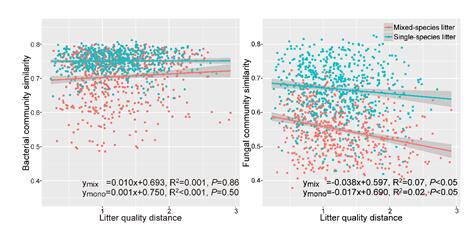Changes In Litter Quality Induced by N Deposition Alter Soil Microbial Communities
In terrestrial ecosystems, the majority of the above-ground primary production enters the soil system as plant litter. Soil microbial community composition and litter quality are important drivers of litter decomposition, but how litter quality influences the soil microbial composition largely remains unknown.
Dr. LI Yingbin, Prof. LI Qi and Prof. LIANG Wenju from Institute of Applied Ecology of the Chinese Academy of Sciences conducted a microcosm experiment to examine the effects of changes in litter quality induced by long-term N deposition on soil microbial community composition. The litters were decomposed in a standard live soil after which the composition of the microbial community was determined by Illumina MiSeq Sequencing.
They found that changes in litter quality induced by N-addition increased the diversity of the fungal community, but not bacterial diversity. The relative abundance of saprophytic fungi and ammonia-oxidizing bacteria changed with litter quality. Those results presented robust evidence for the plant-mediated pathways through which N-deposition affects the soil microbial community and biogeochemical cycling.
This study was published in Soil Biology and Biochemistry entitled “Changes in litter quality induced by N deposition alter soil microbial communities”.
The research was supported by the Natural Science Foundation of China and the Strategic Priority Research Program of the Chinese Academy of Sciences.

Fig 1. Correlation between bacterial and fungal community similarity (Bray-Curtis distance) and litter quality similarity (Euclidean distance).
Email: yueqian@iae.ac.cn
Publication Name: LI Yingbin et al.



